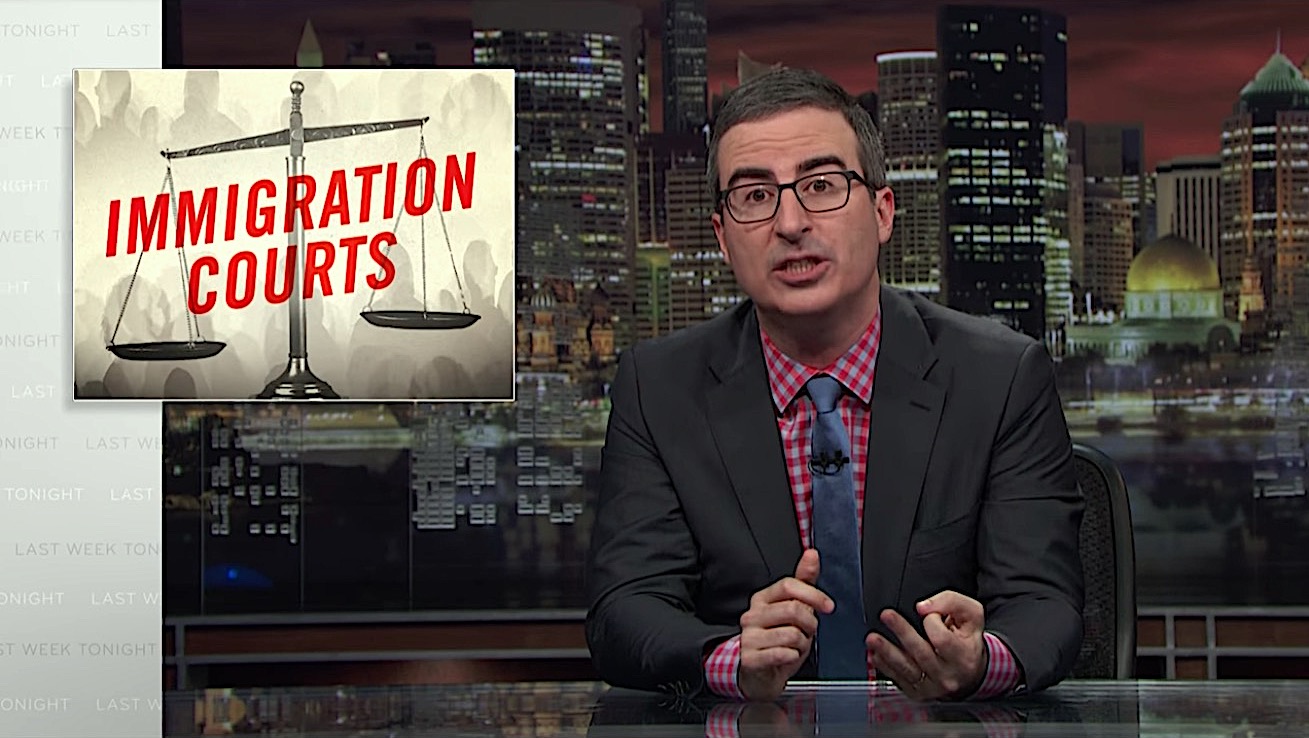John Oliver uses a grimly hilarious court TV show to highlight the problems with U.S. immigration courts


A free daily email with the biggest news stories of the day – and the best features from TheWeek.com
You are now subscribed
Your newsletter sign-up was successful
U.S. immigration courts are "one of those things that you may not know much about, but are actually hugely important to a significant number of people — like gefilte fish or the Insane Clown Posse," John Oliver said on Sunday's Last Week Tonight. You've probably seen stories of ICE raids on workplaces and families, but America's immigration court system, where those detainees end up, "is no less troubling," Oliver said. These 60 courts hear hundreds of thousands of cases a year, the stakes can be life or death, and "the system is a complete mess."
Oliver walked through how we got to a situation where, in the words of one judge, the courts are "doing death penalty cases in a traffic court setting," including a surge of immigration from Central America, ramped-up immigration enforcement, and the "glacial" hiring of judges. Also, because these are civil trials not criminal ones, the government doesn't have to provide lawyers for those who can't afford them, so the majority of immigrants — some as young as 2 years old — show up in court without an attorney. To show how ridiculous that is, Oliver played parts of "the single greatest mock trial ever recorded," of a 3-year-old trying to learn immigration law, as suggested by an actual immigration judge.
America's immigration courts need serious fixing, starting with more judges and, more importantly, judicial independence, Oliver said, noting that these courts are part of the Justice Department, not the judiciary. But that won't happen with this Congress or this attorney general. "Immigration courts are a lot like sex," he joked: "The way to improve them is rarely to say, 'Hey, let's do it a lot faster and meaner, and let's have Jeff Sessions overseeing the whole thing.'" He ended with a preview of "the stupidest new court show imaginable," Tot Bench, where 3 and 4 year olds try adults, in this case, H. Jon Benjamin. Watch below. Peter Weber
The Week
Escape your echo chamber. Get the facts behind the news, plus analysis from multiple perspectives.

Sign up for The Week's Free Newsletters
From our morning news briefing to a weekly Good News Newsletter, get the best of The Week delivered directly to your inbox.
From our morning news briefing to a weekly Good News Newsletter, get the best of The Week delivered directly to your inbox.

A free daily email with the biggest news stories of the day – and the best features from TheWeek.com
Peter has worked as a news and culture writer and editor at The Week since the site's launch in 2008. He covers politics, world affairs, religion and cultural currents. His journalism career began as a copy editor at a financial newswire and has included editorial positions at The New York Times Magazine, Facts on File, and Oregon State University.
-
 Why is the Trump administration talking about ‘Western civilization’?
Why is the Trump administration talking about ‘Western civilization’?Talking Points Rubio says Europe, US bonded by religion and ancestry
-
 Quentin Deranque: a student’s death energizes the French far right
Quentin Deranque: a student’s death energizes the French far rightIN THE SPOTLIGHT Reactions to the violent killing of an ultraconservative activist offer a glimpse at the culture wars roiling France ahead of next year’s elections
-
 Secured vs. unsecured loans: how do they differ and which is better?
Secured vs. unsecured loans: how do they differ and which is better?the explainer They are distinguished by the level of risk and the inclusion of collateral
-
 ‘One Battle After Another’ wins Critics Choice honors
‘One Battle After Another’ wins Critics Choice honorsSpeed Read Paul Thomas Anderson’s latest film, which stars Leonardo DiCaprio, won best picture at the 31st Critics Choice Awards
-
 A peek inside Europe’s luxury new sleeper bus
A peek inside Europe’s luxury new sleeper busThe Week Recommends Overnight service with stops across Switzerland and the Netherlands promises a comfortable no-fly adventure
-
 Son arrested over killing of Rob and Michele Reiner
Son arrested over killing of Rob and Michele ReinerSpeed Read Nick, the 32-year-old son of Hollywood director Rob Reiner, has been booked for the murder of his parents
-
 Rob Reiner, wife dead in ‘apparent homicide’
Rob Reiner, wife dead in ‘apparent homicide’speed read The Reiners, found in their Los Angeles home, ‘had injuries consistent with being stabbed’
-
 Hungary’s Krasznahorkai wins Nobel for literature
Hungary’s Krasznahorkai wins Nobel for literatureSpeed Read László Krasznahorkai is the author of acclaimed novels like ‘The Melancholy of Resistance’ and ‘Satantango’
-
 Primatologist Jane Goodall dies at 91
Primatologist Jane Goodall dies at 91Speed Read She rose to fame following her groundbreaking field research with chimpanzees
-
 Florida erases rainbow crosswalk at Pulse nightclub
Florida erases rainbow crosswalk at Pulse nightclubSpeed Read The colorful crosswalk was outside the former LGBTQ nightclub where 49 people were killed in a 2016 shooting
-
 Trump says Smithsonian too focused on slavery's ills
Trump says Smithsonian too focused on slavery's illsSpeed Read The president would prefer the museum to highlight 'success,' 'brightness' and 'the future'
